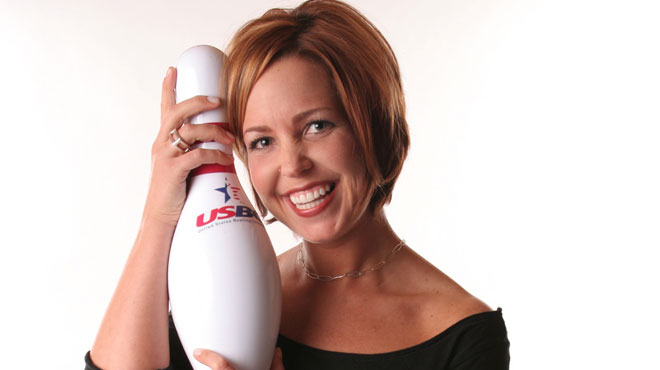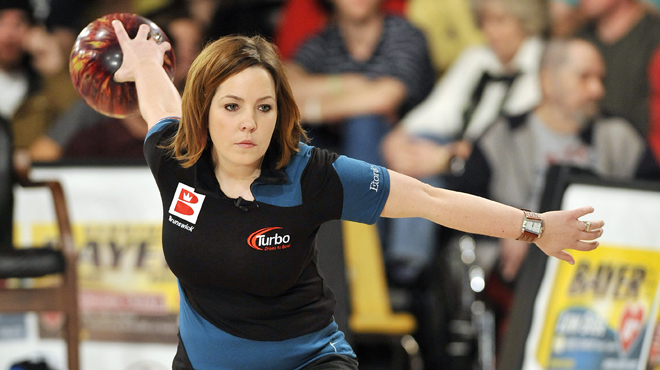Asbaty gearing up for USBC Queens

 You might think the 15 weeks Diandra Asbaty had to prepare for the 2011 PBA Tournament of Champions after giving birth to her first child would be too little time. Then you look for her name in the tournament’s final standings and it hits you: This is no ordinary mother.
You might think the 15 weeks Diandra Asbaty had to prepare for the 2011 PBA Tournament of Champions after giving birth to her first child would be too little time. Then you look for her name in the tournament’s final standings and it hits you: This is no ordinary mother.
Asbaty, a World Bowling Writers Hall of Famer and 13-time Team USA member, finished as the highest-cashing woman in the field, 16 places above defending champion Kelly Kulick and higher even than some of the top men in bowling today—Wes Malott, Patrick Allen, Rhino Page, Pete Weber.
“I am not bowling for myself anymore,” says Asbaty, who gave birth to son Madden Haledon Asbaty last August. “I am bowling to make him proud and to support him. That changes everything. And it helps my swing stay loose knowing that whether I win or lose, he is still going to love me.”
He is also one of the most well-traveled babies in the world. At just seven months old, Madden has accompanied his mother on two trips to Las Vegas, a stint in New Jersey for the U.S. Open, coaching appearances in Long Island and Green Bay, and a PBA stop in Indianapolis.
Oh, and he has already been on TV, too—before he was even born.
“To have his heart inside of me at that tournament was a big reason why I won it,” Asbaty says of the PBA Don and Paula Carter Mixed Doubles title she seized with Brian Voss last year, a few months into her pregnancy. “I am giving him that trophy. I will inscribe it and it will be his first birthday present.”
If these travels and triumphs paint the picture of a woman who has some unfinished business to resolve, there’s a reason for that. The next stop on Asbaty’s relentless itinerary is the OnCenter Complex in Syracuse, where she will compete in the 2011 USBC Queens and bowl for another chance to avenge perhaps the most difficult moment of her career.
“It was really devastating for me,” Asbaty says of the 144 she bowled in the title match of the 2007 Queens, falling to eventual champion Kelly Kulick after going undefeated in match play. “I was the number one seed and it was my first time on live TV, and I made every mistake in the book. I rushed, I missed spares; I was never able to be myself. It was really discouraging because nobody saw how great I bowled all week. They just saw what I bowled on TV. Before I knew it, the game was over and I lost by a lot.”
Asbaty could not have known it then, but the great week of bowling that crashed to a halt in a match that felt like it lasted a minute was the first step toward one of her greatest accomplishments, and a story she would tell for years.
It is not a story of failure; it is a story of what a champion does after she fails. How that, more than anything, is what distinguishes greatness from mediocrity.
“One of the things I speak to groups about often is how you learn a lot more from failing than you do from winning,” Asbaty begins. “Literally the morning after I lost the Queens, I had to pick up my things and bowl the World Ranking Masters in Florida. The last thing I wanted to do was go right into another tournament. I hadn’t even gotten over the night before. I couldn’t collect myself; I didn’t know how I would be OK.
“I showed up with tears in my eyes. I told my coach ‘I don’t know how to shake this off; it is all I’m thinking about. I am just devastated.’ But there was nothing anyone could say.”
But the mother Madden will come to know know is the one who learned that you have to fail before you have any idea what it takes to win, that dreams come to those who find the courage to chase them even when it seems like they’re nowhere to be found.
He will know about the teenage girl who watched her sister, Kassy, win the Alberta E. Crowe Star of Tomorrow award in 1995 and decided she would win it too, the girl who went home that night and wrote the speech she would make when she won.
“I was laying in bed that night and I started writing my speech,” Asbaty recalls. “I remember writing down the people I would thank and the things I would say. It was like I saw it before it happened.”
Then, in 1998, it happened. She won the award just three years after her sister did.
“You can be as good as you choose to be,” she says. “You just have to make up your mind and go after it.”
But Madden won’t have to take her word for it. All he will have to do when he is older is look up the record of how she responded to her failure at the 2007 Queens with one of the greatest triumphs of her career at that World Ranking Masters event a few days later, where she opened with a miserable 169 and found herself in the bottom third of the standings after day one.
“You just need time to pick up the pieces, and I didn’t have that time between those tournaments,” Asbaty explains. “Finally, I had time to reflect on what went wrong at the Queens, and I felt like I was going to be OK. Even the lane man that morning said to me ‘You look different today’ as I was getting ready for my squad. And I said ‘Yeah, I feel different.’ So it was noticeable.”
Just as noticeable was the 234 average she recorded for that day’s eight-game block, and the 240 average she posted the following day on which one lane featured a short pattern and the other a long pattern, forcing bowlers to play two completely different angles on the same pair.
“If anything else besides first place is a loss, then you have to learn how to lose in order to know how to win,” she said upon winning the tournament just days after that brutal match at the Queens.
Life did not waste any time testing the wisdom Asbaty gleaned from failure when, months later, she found herself down by nearly 50 pins to one of the greatest players in women’s bowling history—Carolyn Dorin-Ballard—at the 2007 Great Lakes Classic.
“At that moment, I knew all the things that I was not going to do,” Asbaty explains. What she did do, though, was smile. And breathe. And look like she enjoyed what she did for a living. In other words, everything she forgot to do at the Queens. For Diandra Asbaty, winning is not so much about trying to win; it’s about conducting yourself like a winner. The rest takes care of itself.
What she did do, though, was smile. And breathe. And look like she enjoyed what she did for a living. In other words, everything she forgot to do at the Queens. For Diandra Asbaty, winning is not so much about trying to win; it’s about conducting yourself like a winner. The rest takes care of itself.
“Things weren’t looking too good, not when you’re down 50 pins to Carolyn Dorin-Ballard,” Asbaty admits. “But I knew one of the things I was going to do well was slow everything down and bowl at my own pace, take my time, and make sure that when people watch this show they will see how much I love to do what I do. That’s how I was able to make the best shots I could.”
By the time the last ball was thrown that day, it was Diandra Asbaty, not Carolyn Dorin-Ballard, who hoisted the trophy above her head and smiled for the cameras. And if she finds herself a game away from a Queens title again this month, that is the Diandra Asbaty the audience will see.
“I will smile more, I will take my time, I will enjoy the moment and make sure everybody can tell how much I love to do this,” Asbaty says of the possibility. “Winning the Queens would mean so much to me, especially because my son is going to be there. I know I can do it. Those women are amazing bowlers and it will not be easy, but I know I can be in contention and if I make good decisions and everything falls in place, I know I can do it.”
After all, you just have to make up your mind and go for it.





